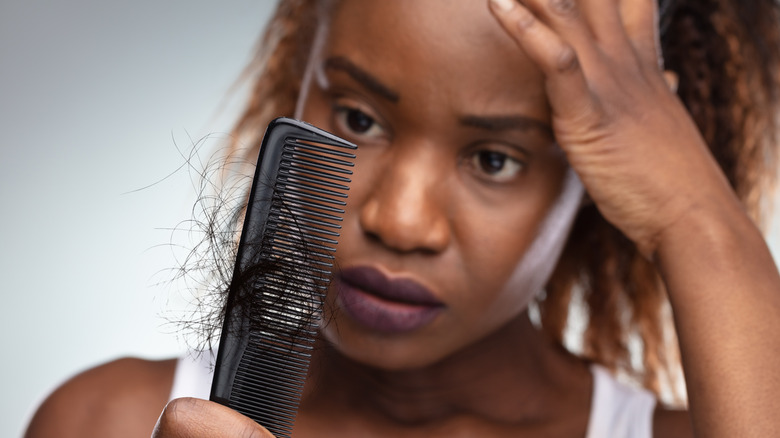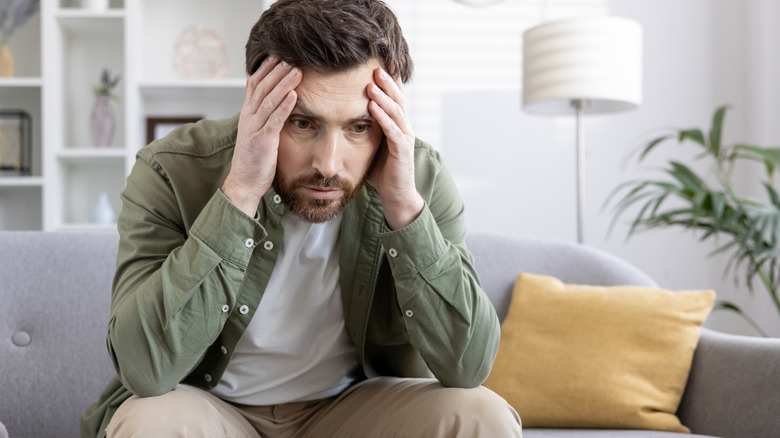Can A Stroke Cause Hair Loss? Here's What To Know
It's not uncommon to hear celebrities gushing over luxury personal care products. In 2023, Sharon Stone credited a pricey shampoo and conditioner with restoring the hair she lost after having a stroke (via InStyle). However, what's most intriguing about thus particular story, from a health perspective, isn't the beauty brand itself, but the stroke-hair connection.
Stroke is among the most common of all cardiovascular diseases, affecting at least 795,000 individuals annually (via Centers for Disease Control and Prevention). During a stroke, insufficient amounts of blood travel through the brain. Without access to oxygen, parts of the brain start to die. That's why some people who survive strokes suffer permanent disabilities.
The list of classic post-stroke side effects — including balance issues, aphasia, and personality changes — doesn't include hair loss. But that doesn't mean that your hair can't fall out if you've experienced a stroke. Several tangential factors could lead to thinning hair or bald spots, starting with stress.
How hair can be affected by stress and psychological trauma
Having a stroke can produce a surge of stress-related emotions. According to a 2022 study in Stroke, post-traumatic stress disorder (PTSD) affects around one-quarter of stroke survivors. One of the serious ways stress can do damage to your body is by interfering with hair growth. Indeed, extreme stress is a notable precursor to a type of hair loss called telogen effluvium.
During telogen effluvium, the processes that encourage hair growth become dormant, but existing hair still naturally sheds. Since there's no hair to replace the hair that falls out, balding may occur over a period of months. Though the condition isn't gender-specific, women are more susceptible to developing telogen effluvium. Typically, hair starts to regrow within about six months, although chronic telogen effluvium can lead to longer cyclic loops of hair loss followed by hair growth.
Treatment isn't always needed for telogen effluvium because it can go away on its own. One recommendation to stimulate hair regrowth is to use topical minoxidil. However, minoxidil may not be appropriate for someone with a prior heart condition, and a stroke is a cardiovascular event. For the record, the hair products Sharon Stone used do not contain minoxidil, though they contain vitamin B5, which is thought to support hair health.
How hair can be affected by endocrine system fluctuations
Another possible link between hair loss and stroke involves hormonal disruption. As explained in a 2023 review of endocrine responses post-stroke in Trends in Endocrinology and Metabolism, stroke can interfere with normal hormonal functioning.
A 2023 study in Thyroid Research showed that the more severe a stroke was, the more affected the hormones could be. Indeed, a 2021 review in the Journal of Neuroimmune Pharmacology determined that stroke could double a person's likelihood of being diagnosed with hypothyroidism, a condition that may produce hair thinning and balding.
Speaking to the Cleveland Clinic, endocrinologist Dr. Mary Vouyiouskis Kellis explained that this type of hair issue "is typically reversed after your thyroid hormone levels are normalized." However, she admitted that recovery could take a while. Generally speaking, hypothyroidism causes hair thinning, not bald patches. Sharon Stone described her stroke-precipitated hair loss as happening on the sides of her head.


